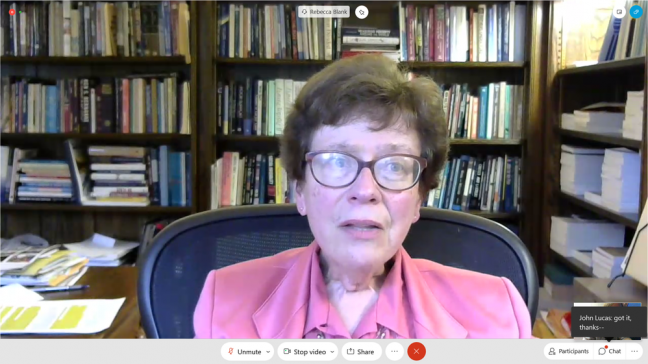Wisconsin Alumni and the University of Wisconsin hosted a virtual livestream and Q&A event Tuesday night with Chancellor Rebecca Blank to discuss what the rest of the year will look like on campus.
CEO of the UW Foundation Mike Knetter facilitated the meeting.
Blank began by highlighting some good news, focusing on the diversity of the freshman class, incoming faculty and an all-time six-year graduation rate of 88.5% which ranks UW in the top three highest graduation rates in the Big Ten and in the top ten of all big public schools.
Blank said we are currently in the midst of three crises.
“A crisis related to COVID, a crisis related to budget and a crisis related to this social revolution around racial justice,” Blank said.
Blank said measures to lower positive rates such as quarantining the Witte and Sellery residence halls and halting in-person classes worked well and new measures have been implemented to keep the numbers low.
According to Blank, these measures include a heightened testing capacity and emergency testing.
“We have now had more than two weeks of very low numbers, this last week has been particularly low,” Blank said. “And we are doing more testing now than we were before.”
Regarding budget, Blank said auxiliary programs including unions, dorms, eating facilities and the athletics program are making 15% of what they would normally make.
According to Blank, state budget lapses have resulted in a loss of $40 to $50 million.
“That together with the auxiliary losses has put us in the worst situation that anyone has seen around the university,” Blank said.
Blank also highlighted the university’s emphasis on creating a more diverse campus
According to Blank, the incoming freshman class is the most diverse class UW has ever seen, with 13.5% of the incoming freshman class from targeted underrepresented groups. But, there are still many changes to be made.
“The demand that we need to be a different and better institution is going to have a bigger long term impact than COVID,” Blank said. “We are a white institution in a very white state.”
The last half of the meeting was dedicated to questions from Knetter as well as alumni, parents and students attending the meeting.
Blank said the greatest short term need for a successful second semester would be an expansion of testing capacity.
“That is the best way to control infections and feel safe about everything else that we are doing,” Blank said.
Blank closed with a message to alumni regarding what they can do to help. Her suggestions included checking in with students, communicating the importance of the university and its science programs to the Wisconsin legislature and getting involved through donations of time or money.


